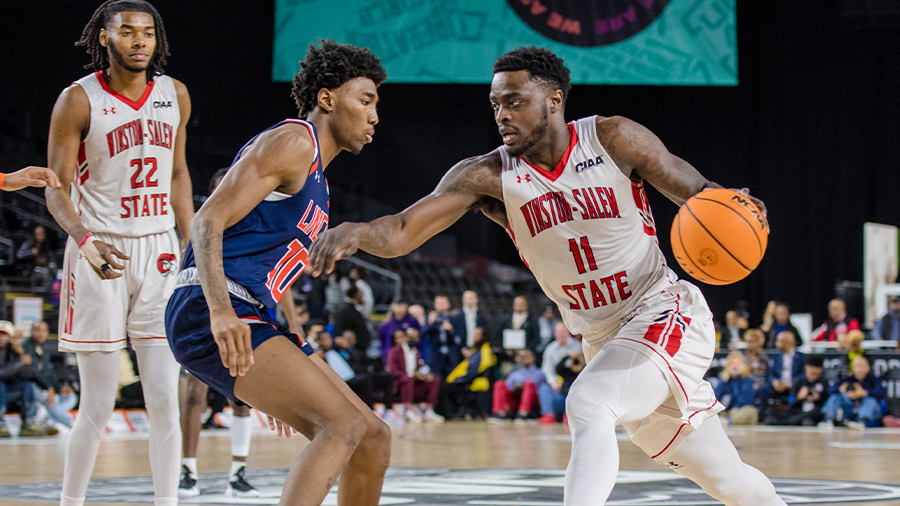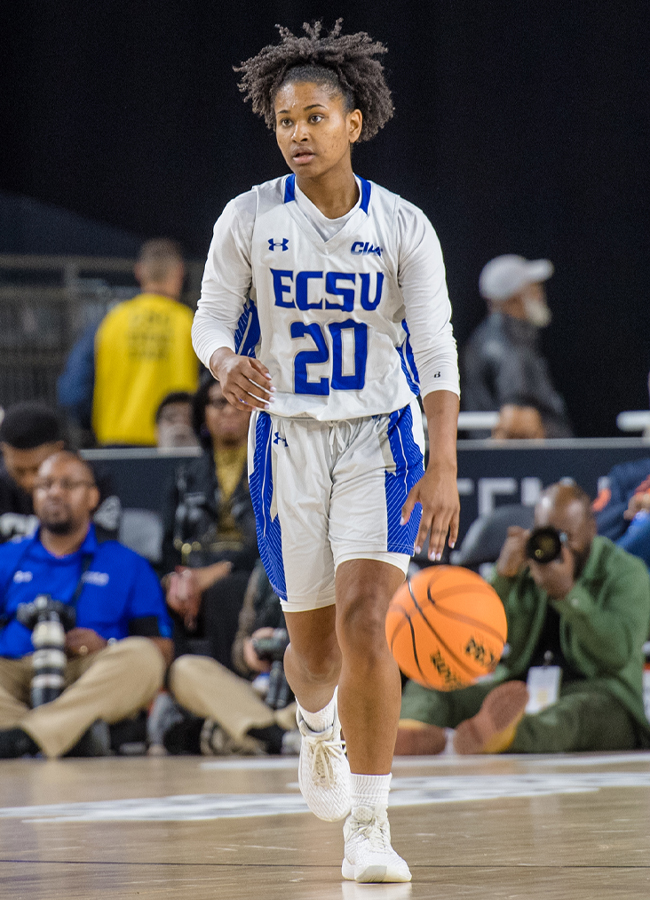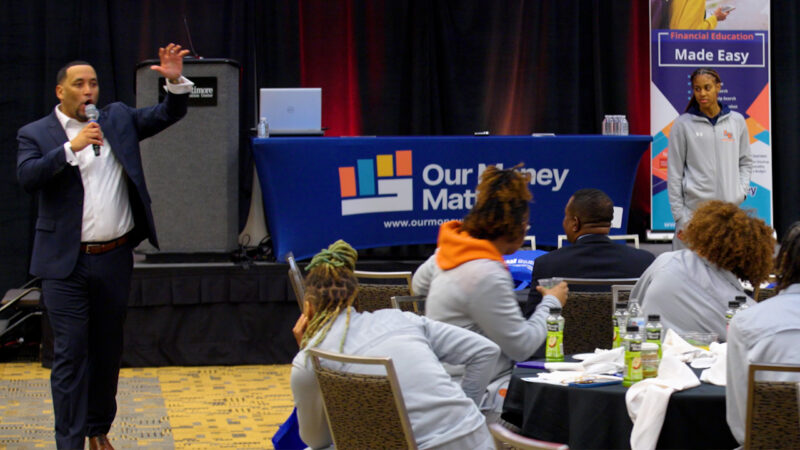Four plays for improving your financial health
Wells Fargo hosted a financial literacy breakfast with Our Money Matters at the CIAA Tournament in Baltimore last month.
Men’s and women’s basketball players at Central Intercollegiate Athletic Association, or CIAA, schools know all about winning plays on the hardwood. After all, successful scoring, rebounding, and defending require practice, diligence, and a good game plan.
Finances after college, the student-athletes learned at a financial literacy breakfast on Feb. 21, aren’t that dissimilar. The breakfast was sponsored by Wells Fargo — the official banking partner of the CIAA — with curriculum presented by Our Money Matters, or OMM.
The Wells Fargo Foundation is the exclusive funder of Our Money Matters, launched in collaboration with HBCU Community Development Action Coalition to equip college students of color with the financial knowledge, tools, access, and opportunities to close the racial wealth gap.
“Income disparities and racial discrimination affect the wealth gap that students of color experience during and after college. Financial literacy can help students decrease this gap, increase financial stability, and enable wealth building,” said Bonnie Wallace, head of Financial Health Philanthropy at Wells Fargo.
More than 200 men’s and women’s basketball players attended the breakfast before the start of the 2023 CIAA Tournament — one of the most prestigious sporting events among historically Black colleges and universities, or HBCUs.
"Financial literacy is something I'm just beginning to fully understand," said Raemaad Wright, a starting forward on Virginia Union University men's team. "I think this breakfast was really important because it'll help me better prepare myself financially to create generational wealth."
LaRese Purnell, an author, brand ambassador for OMM, and co-owner and managing partner of CLE Consulting Firm, shared financial health tips and tricks with the student-athletes.
Below are four tips he shared with the players that can also help you win in the game of financial health.

1. Share the ball
No one wants to play on a team where one person takes all the shots and gets all the glory. That’s why Purnell shared one of the crown jewels of OMM — the 50/20/30 rule.
Its goal is to make people think about the distribution of their money. From every $1, 50 cents should go toward basic needs, 30 cents to investments (saving), and 20 cents to wants.
“We have so many people come to us at an older age and say they can’t apply this rule because of kids and mortgages and other things,” said Purnell. “But these players are at the perfect age to set this standard, so they can apply it before all the big things come in life.”
“If we can get them, at this age, to understand credit … that’s potentially life-changing.” — LaRese Purnell, brand ambassador for Our Money Matters
2. Know the score
According to the Urban Institute, young adults in majority-Black communities have a median credit score of 582, those in majority-Hispanic communities a 644, and those in majority-white communities a 687.
People with credit scores below 600 often find it more difficult and expensive to secure mortgages, business and car loans, and other types of credit.
That’s why Purnell rallied for participants to shout “800!” during the OMM session at the CIAA tournament.
“One way to lessen the racial wealth gap is to level the playing field,” he explained. “If we can get them, at this age, to understand credit and boost them to an 800 score, that’s potentially life-changing. They can get credit for those big purchases later in life, and not be held down by poor choices in years past.”
A credit score at 800 and above is appealing to lenders and often provides mortgage, auto, and personal loans with better terms.
3. Take good shots
In finances, there typically aren’t quick-fix solutions. Saving, investing, paying down debt, and improving your credit score take time and focus.
It can be easy to take your eyes off the ball, make an extravagant purchase or take an expensive trip, and wash away the hard work of raising your credit score.
Our wants make goal setting vital to financial health, Purnell told the student-athletes. Whether it’s saving $10 per check or reducing the number of times you eat out each month, Purnell urges people to have a goal.
Imani Elliot, a point guard on the Fayetteville State University women’s team, said the session was helpful as she begins to transition away from basketball and into full-time work.
“What you do now is going to affect you down the line,” she said. “So, if I can start now, then later (in life), that’s when I’m going to see the benefit. (My) short-term goal is to buy a new car.”

4. Follow the game plan
Financial planning apps and guidance are only a click away for those who wish to use them. OMM offers free online resources — adaptive learning technology and a library of videos and articles — that help individuals get on the path to financial wellness and enable them to meet specific goals.
“We had our team members walking the floor so the student-athletes could download OMM’s resources during the presentation,” said Purnell. “It was exciting to see them engaged and to see that we had 100% participation.”
CIAA Commissioner Jacqie McWilliams also attended the session.
“The importance of financial literacy for our student-athletes can’t be overstated,” McWilliams said. “Many of our players will soon leave our campuses and, for the first time, be tasked with understanding how to prioritize, how to spend their money, how to invest, and how to save. It’s my hope that, with the help of organizations like Our Money Matters and Wells Fargo, our student-athletes see financial health as an opportunity to build long-term, sustainable economic wealth for themselves and their communities.”
See also
Helping HBCU students as they become the leaders of tomorrow (Wells Fargo Stories, March 3, 2023)







